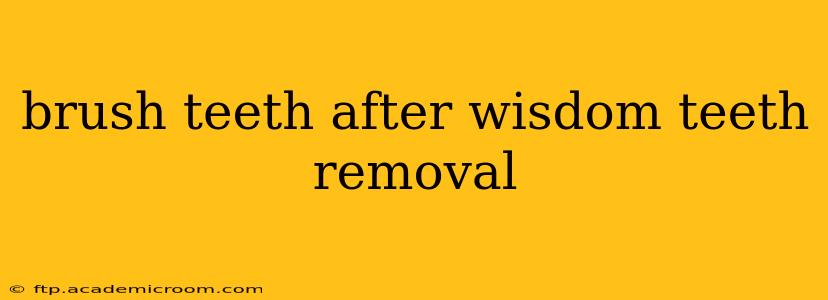Wisdom teeth removal is a common procedure, but knowing how to care for your mouth afterward is crucial for a smooth recovery. One of the most frequently asked questions is about brushing your teeth. This comprehensive guide will address this and other concerns, ensuring you're well-prepared for post-operative oral hygiene.
When Can I Brush My Teeth After Wisdom Teeth Removal?
This is a question many patients have. The answer depends on the specifics of your surgery. Generally, you should wait at least 24 hours after wisdom teeth removal before brushing your teeth. This allows the initial blood clots to form, which are essential for healing and preventing dry socket (a painful complication). Your oral surgeon will provide specific instructions, so always follow their recommendations.
How Should I Brush My Teeth After Wisdom Teeth Removal?
Once your surgeon gives the green light, gentle brushing is key. Here's how:
- Use a soft-bristled toothbrush: Avoid anything harsh that could disturb the healing process.
- Brush gently: Avoid scrubbing or applying pressure around the extraction sites. Focus on the areas not impacted by the surgery.
- Rinse with salt water: After brushing, rinse your mouth with warm salt water (1/2 to 3/4 teaspoon of salt in 8 ounces of warm water). This helps to keep the area clean and can soothe any soreness.
What About the Extraction Sites?
It's vital to avoid directly brushing or disturbing the extraction sites during the initial healing phase. This can dislodge the blood clot, leading to a dry socket. Instead, focus on gently brushing the rest of your teeth and rinsing. As healing progresses, your oral surgeon will advise when you can carefully begin brushing around the extraction sites.
Can I Use Mouthwash After Wisdom Teeth Removal?
Mouthwash can help keep your mouth clean, but again, timing is crucial. Avoid using mouthwash for the first 24-48 hours post-surgery to allow the blood clots to form properly. After that, your surgeon may recommend an alcohol-free mouthwash. Always follow their specific instructions, as some mouthwashes can irritate the healing tissues.
What if I Have Pain or Swelling?
Pain and swelling are common after wisdom teeth removal. Your oral surgeon will likely prescribe pain medication to manage discomfort. Applying cold compresses to your face can also help reduce swelling. If you experience excessive pain, swelling, or bleeding, contact your oral surgeon immediately.
How Long Does It Take to Fully Recover After Wisdom Teeth Removal?
Full recovery varies depending on the complexity of the surgery and individual healing rates. However, most people experience significant improvement within a week or two. Complete healing can take several weeks or even months. Follow your surgeon's aftercare instructions diligently to promote optimal healing.
What are the Signs of a Dry Socket?
A dry socket is a painful complication that can occur when the blood clot at the extraction site is dislodged. Signs include:
- Severe pain at the extraction site
- Bad breath
- Visible bone in the socket
- A foul taste in your mouth
If you experience these symptoms, contact your oral surgeon immediately. They can provide treatment to relieve the pain and promote healing.
This guide offers comprehensive information, but remember, your oral surgeon's instructions are paramount. Always follow their post-operative care guidelines for a successful recovery. They can address your specific concerns and provide the best advice tailored to your situation. Prioritizing proper oral hygiene after wisdom teeth removal is vital for a comfortable and healthy recovery.
